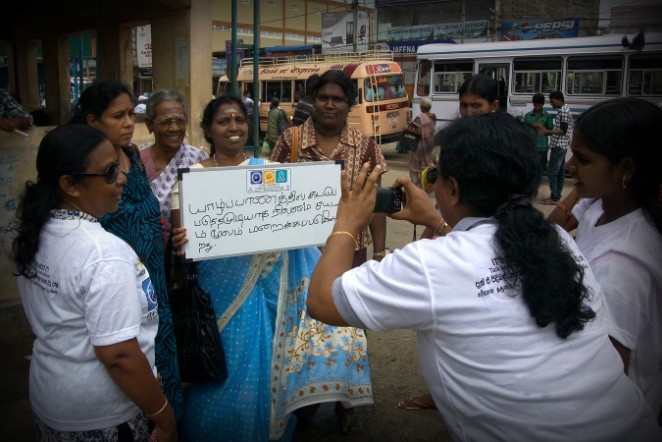
Bridging ethnic divides, more than 1,000 youth from six districts in northern and southern Sri Lanka united in the northern capital of Jaffna in a series of peaceful demonstrations against sexual violence held throughout November and December 2012. Uninterrupted by the military or police, the public demonstrations were part of a campaign message, “It’s time to talk about it. Talk early. Talk often. Prevent sexual violence.”
Last year, a peaceful demonstration at the University of Jaffna turned tragic when the military and police attacked and detained students. Police arrested more than 36 people, and continue to conduct house-to-house inquiries. Students and many of the faculty remain on strike, and the community fears retribution for speaking out.
Since the end of Sri Lanka’s 30-year conflict in May 2009, USAID has aimed to increase civic engagement through activities that allow communities to give voice to issues of importance. The demonstrations against sexual violence highlighted an endemic problem throughout Sri Lanka, while demonstrating to Jaffna authorities and the community that youth can still speak out.
The demonstrations also brought together people who never would have worked toward a common cause during the conflict.
“I am very happy to be here. I feel really proud,” said Kajani Munasinghae, a participant from the south. “Today, when we went around and spoke with community members, they asked where we were from. They were completely shocked when my friend said 'Jaffna' and I said 'Matara.' They could not believe that youth from Matara and Jaffna could work together. We are doing it and we have shown them it is possible.”
Holding homemade signs, the youth walked one and a half miles across the northern capital of Jaffna. They distributed leaflets, provided stickers to vehicle owners, and participated in a social media campaign to capture the community's reactions to the demonstrations and thoughts on sexual violence.







Comment
Make a general inquiry or suggest an improvement.